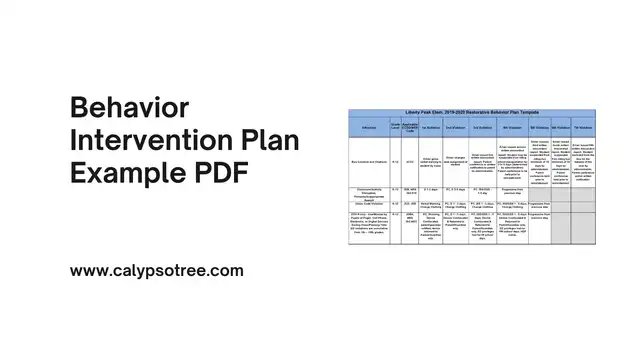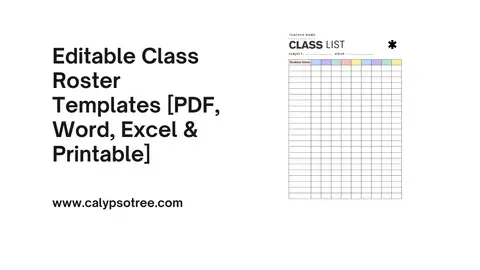Do you need to write a contract, but do not know how to do it properly? Do not waste your time and take a read our brief explanation about what a contract letter is, and how to write a good contract. Besides, you can also take a look at the Contract Templates that we provide at the end of this article.
A Contractor An Agreement Letter
What is an agreement letter? A letter of agreement, which is also called a contract, is actually a letter containing an agreement between the two parties (or more) regarding the rights and obligations of each party. Basically, it is a letter containing the statement to do or not do something.
Functions of a contract
Based on the definition of the letter of agreement above, we can conclude that it mainly serves as authentic evidence that certain parties have entered into a legal agreement. A contract also becomes the basis for carrying out the matters agreed upon by the parties making the agreement. Besides, it can be used as a reference when using a certain party who violates the agreement.
There are many advantages that you can get from making a legal contract. The benefits are:
- It can create a safe feeling for those who made an agreement.
- Each party can know clearly the limits of the rights and obligation in the agreement.
- It can be used to avoid disputes that may arise in the future.
- It can be used as a reference in resolving disputes or cases that may arise due to an agreement.
Criteria of A Legal Contract
A letter of agreement can be said to be valid if it has fulfilled certain conditions. The following are some of the legal requirements of a contract:
- It must be made sincerely, willingly, and without coercion from anywhere.
- The contents of the agreement must be easily understood and agreed to by the involved parties. Besides, it must be made clearly and in detail.
- The parties involved must be mature, and in a sane state and aware when making the agreement.
- The contents of the agreement letter must comply with applicable laws and moral norms.
Tips for Writing a Contract
Writing a contract can seem daunting, but with careful thought and planning, you can create a document that clearly outlines the agreement between parties. Here are some practical tips to help you write an effective contract:
- Use Clear and Simple Language: Legal jargon can make a contract difficult to understand. Aim to use clear, simple language that all parties can easily comprehend. Avoid using complex legal terms unless necessary.
- Be Specific About the Terms: The contract terms should be as specific as possible to avoid misunderstandings. It includes details about the services or goods provided, price, timeline, and other relevant details.
- Include Dispute Resolution Procedures: It is always a good idea to include a contract clause outlining how disputes will be handled. It could involve mediation, arbitration, or going to court. Having this in the contract can save time and money if a disagreement arises.
- Include Termination Clauses: Specify under what conditions the contract can be terminated, by whom, and the consequences of termination. It provides a clear exit strategy for all parties involved.
- Get Legal Advice: If you need clarification on any aspect of the contract, seeking legal advice’s always a good idea. A lawyer can help ensure that the contract is legally sound and that your interests are protected.
- Review and Revise: Do not rush the process. Take the time to review the contract thoroughly and make revisions as necessary. Spending extra time getting the contract right is better than facing legal issues.
It can help prevent misunderstandings and disputes and protect the interests of all parties involved.
Types of Contracts
Contracts come in various forms, and each is developed to cover specific agreements and transactions. Here are some typical kinds of agreements and a brief overview of each:
- Employment Contracts: Outlining job roles, salary, benefits, and termination grounds.
- Independent Contractor Agreements: These particularly the job nature, settlement terms, and the non-employer-employee relationship.
- Investment Contracts: Specify investment terms, expected returns, and associated risks.
- Construction Contracts: outlining work scope, cost, timeline, and other task components.
- Service Contracts: Contracts between assistance providers and buyers describing delivered services, payment terms, and desired results.
- Sales Contracts: Agreements for goods or property sales outlining the item, purchase price, and delivery terms.
Each contract type has specific considerations and legal requirements, so using the appropriate contract for each situation is crucial.
Using Contract Templates
Contract templates can be a valuable tool for businesses and individuals, providing a structured agreement format and saving time and resources. Here is a closer look at the benefits and potential drawbacks of using contract templates and some tips for using them effectively.
Benefits of Using Contract Templates:
- Efficiency: Contract templates can significantly speed up the contract drafting process. With a template, you can fill in the specific details of your agreement rather than writing a contract from scratch.
- Consistency: Using a template ensures consistency across your contracts, which can be particularly beneficial for businesses that frequently enter into similar agreements.
- Legal Compliance: Many contract templates are designed by legal professionals and are structured to comply with the law. It can provide a solid starting point and help ensure your contract is legally sound.
Drawbacks of Using Contract Templates:
- Lack of Customization: While contract templates can be modified, they may only partially cater to the unique needs of every agreement. Some contracts may require specific clauses or terms not included in a standard template.
- Legal Risks: While templates can provide a good starting point, legal advice should differ. Any contract reviewed by a legal professional must ensure it is legally sound and suitable for your situation.
Tips for Using Contract Templates Effectively:
- Customize as Needed: Feel free to modify the template to suit your needs. Add, remove, or change clauses as necessary to reflect the specifics of your agreement.
- Seek Legal Advice: Even if you are using a template, it is a good idea to have the contract reviewed by a lawyer. They can ensure that the contract is legally sound and that you fully know your rights and obligations.
- Keep it Simple: Keep your contract as simple as possible. Use clear, concise language and avoid legal jargon where possible.
- Review Regularly: Laws and circumstances can change, so reviewing your contract templates is a good idea to ensure they remain up-to-date and legally compliant.
Always ensure your contract accurately reflects your agreement and seek legal advice when necessary.
contract template
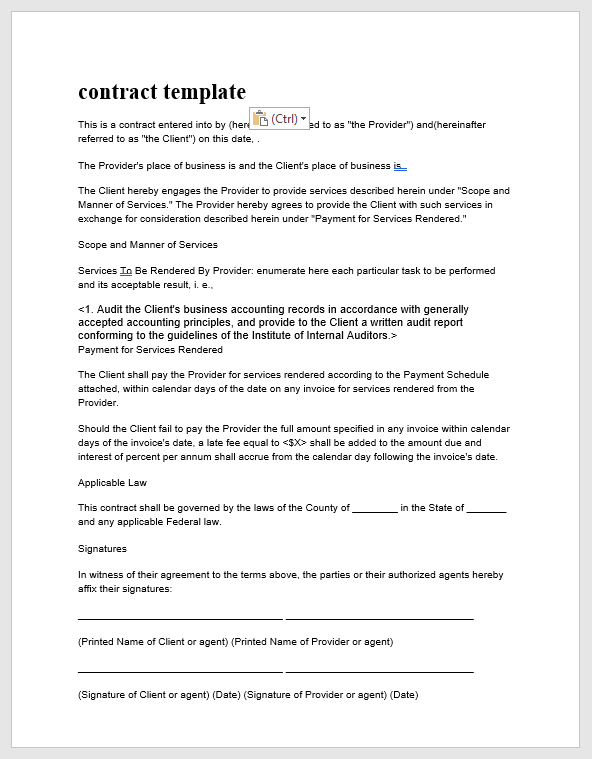
Contract Template Word
Microsoft Word offers a variety of tools that can be used to create contract templates. You can use tables, text boxes, and other formatting tools to create a structured and professional-looking contract. You can also use Word’s built-in styles to ensure consistency throughout the document. Additionally, Word allows you to save your contract as a template, so you can easily reuse it in the future.
Contract Template Google Docs
Google Docs is a great tool for creating contract templates, especially if you need to collaborate with others. You can use tables and text boxes to create a structured contract and use Google Docs’ commenting and suggestion features to collaborate with others. Plus, Google Docs allows you to save your contract as a template in your Google Drive, making it easy to access and reuse.
Contract Template for Services
It should contain elements such as the service’s scope, the contract’s period, payment terms, and any specific requirements or expectations. Service providers such as consultants, freelancers, and agencies commonly use this kind of agreement template.
Contract Template PDF
It is a non-editable contract version that can be used for reference or signing. It is often used when the contract needs to be printed or when the contract needs to be sent electronically and preserved in its original format.
Contract Template for Partnership
It should contain elements such as the roles and duties of each partner, the distribution of profits and losses, and the procedures for determining conflicts and dissolving the partnership.
Contract Template for Construction
A construction contract template outlines the terms of a construction project. It should include details such as the scope of the work, the timeline for completion, the budget, and the responsibilities of each party. Construction companies and contractors commonly use this type of contract template.
Contract Template for Employee
An employee contract template outlines the terms of an employment relationship. It should include details such as the employee’s role and responsibilities, the salary and benefits, and the terms of termination. This type of contract template is commonly used by employers when hiring new employees.
Contract Template for Virtual Assistant
A virtual assistant contract template outlines the terms of a virtual assistant’s services. It should include details such as the scope of the services, the payment terms, and the confidentiality agreement. Virtual assistants and their clients commonly use this type of contract template.
Employment Contract Template
An employment contract template outlines the terms of an employment relationship. It should include details such as the employee’s role and responsibilities, the salary and benefits, and the terms of termination. This type of contract template is commonly used by employers when hiring new employees.
Behavior Contract Template
A behavior contract template is an agreement to improve a person’s behavior. It outlines the expected behavior, the consequences for not meeting those expectations, and the rewards for meeting or exceeding them. This type of contract template is commonly used in schools and therapy settings.
Business Contract Template
A business contract template outlines the terms of a business agreement. It should include details such as the scope of the agreement, the responsibilities of each party, and the terms of termination. This type of contract template is commonly used in business relationships, such as partnerships or vendor agreements.
Rental Contract Template
A rental contract template outlines the terms of a rental agreement. It should include details such as the rental price, the rental duration, the responsibilities of the tenant and landlord, and the terms of termination. Landlords and property managers commonly use this type of contract template.
Service Contract Template
A service contract template outlines the terms of a service that will be provided.
It should include details such as the service’s scope, the contract’s duration, payment terms, and any specific requirements or expectations. This type of contract template is commonly used by service providers such as consultants, freelancers, and agencies.
Loan Contract Template
A loan contract template outlines the terms and conditions of a loan agreement between two parties – the lender and the borrower. It should include details such as the loan amount, interest rate, repayment schedule, and any penalties for late payment or default.
The loan amount and interest rate should be clearly stated, as well as whether the interest rate is fixed or variable. The repayment schedule should detail when payments are due, how much each payment will be, and how long the borrower has to repay the loan.
Penalties for late payment or default should also be included in the contract. It could include additional fees, increased interest rates, or legal action. The contract should also specify what constitutes a default, such as missing a certain number of payments.
Work Contract Template
A work contract template outlines the terms of an employment relationship between an employer and an employee. It should include details such as the employee’s job title, duties, salary, benefits, and terms of termination.
The job title and duties should be clearly defined, and the salary should be stated along with any additional compensation such as bonuses or commissions. The contract should also detail any benefits the employee is entitled to, such as health insurance or paid time off.
Terms of termination should specify under what conditions the employer or employee can end the contract and what notice must be given. It may also include clauses about confidentiality, non-compete, and dispute resolution.
Simple Contract Template
A simple contract template is a basic agreement between two parties. It should include the parties’ names, the agreement’s terms, and signatures from both parties.
The terms of the agreement should be clearly stated and easy to understand. It could include details about the goods or services, the price, and when and how the exchange will occur.
Both parties should sign and date the contract to make it legally binding. A simple contract template can be used for various agreements, such as sales, service, or rental agreements. It provides a straightforward way to outline the terms of an agreement and ensure both parties understand their obligations.
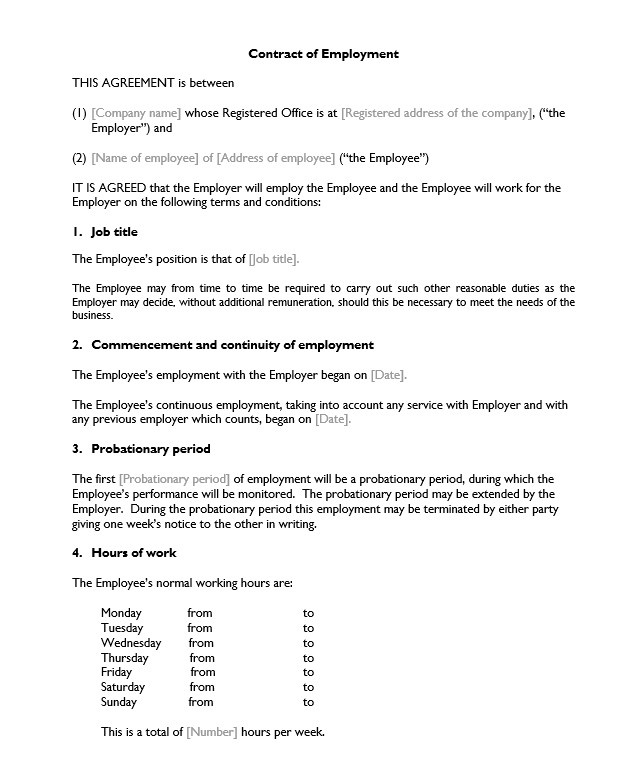
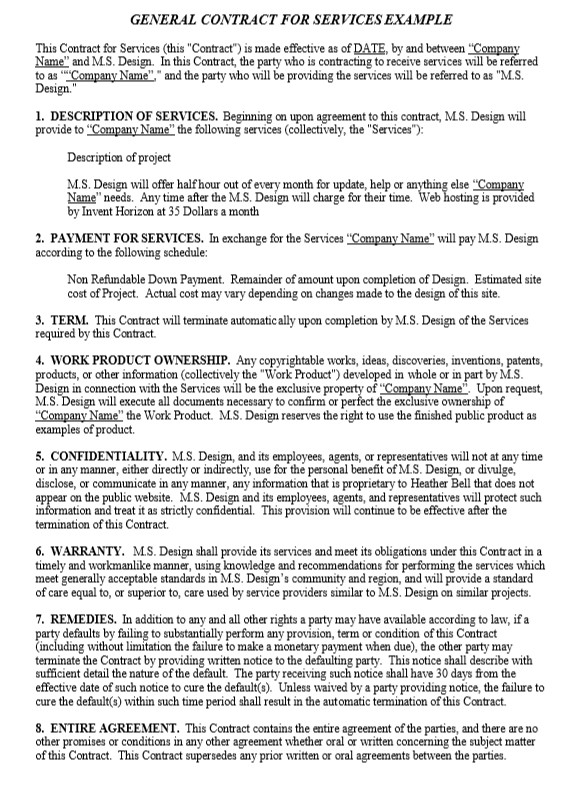
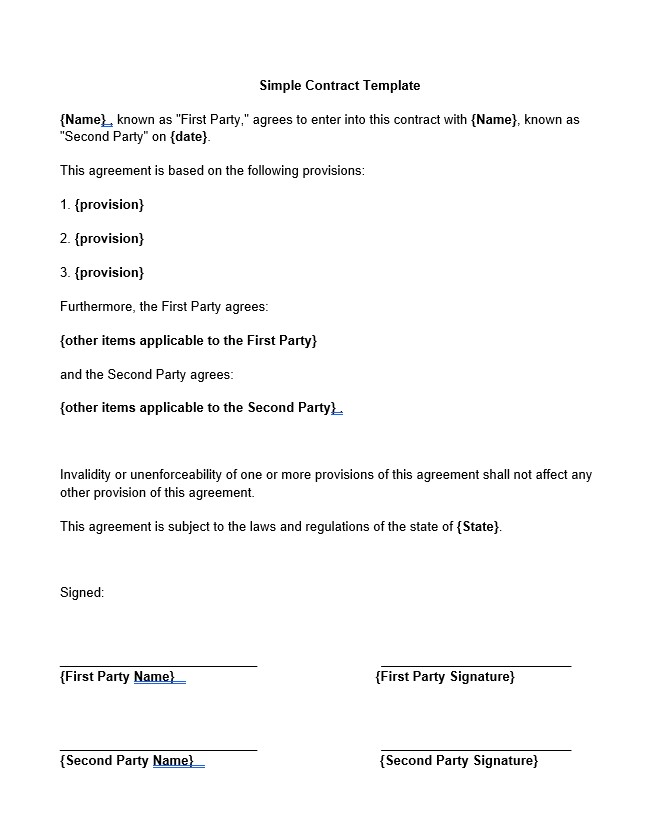
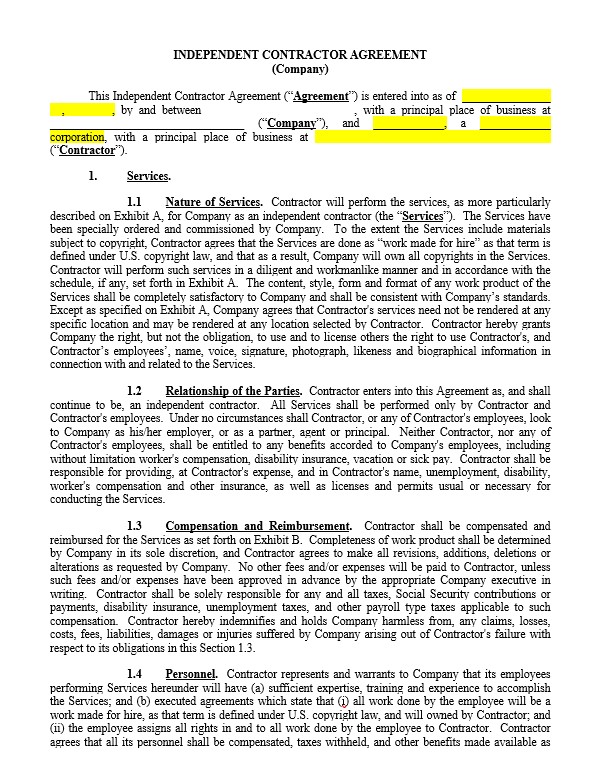
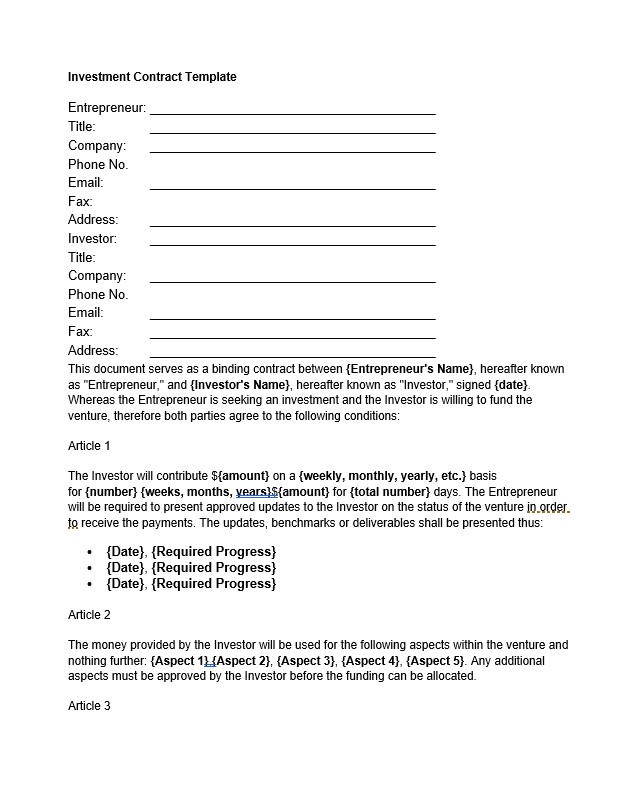
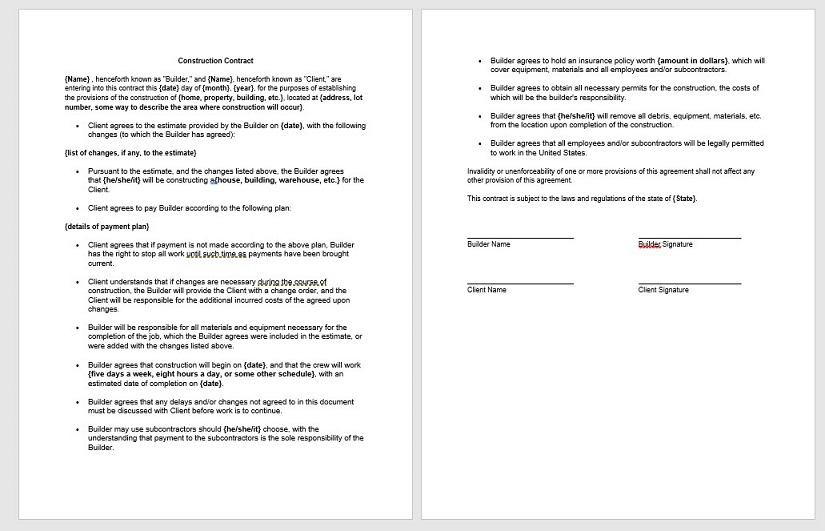
Element of Contract Templates
A contract template, while customizable to specific situations, typically includes several key elements forming a legally binding agreement. Here are the main elements that should be present in a contract template:
- Parties Involved: The contract should identify the parties involved in the agreement. It typically includes the full legal names of individuals or businesses.
- Scope of Agreement: The contract should clearly define the scope of the agreement, outlining what is expected from each party. It could include the goods or services to be provided, timelines, etc.
- Payment Terms: If the contract involves a financial transaction, the payment terms should be clearly outlined. It includes the amount to be paid, the payment method, and the schedule.
- Duration of Contract: The agreement should set the duration of the agreement, including the start and end dates. The renewal terms should also be included if the contract is to be renewed.
- Termination Clause: The agreement should contain a clause summarizing the conditions under which the agreement can be completed. It could include a breach of contract, mutual agreement, or other specific circumstances.
- Dispute Resolution: The agreement should have a clause that outlines how disputes will be resolved. It could involve mediation, arbitration, or legal proceedings.
- Confidentiality Clause: If the contract involves sharing confidential information, a confidentiality clause should be included to protect this information.
- Governing Law: The contract should specify the jurisdiction or country’s law that will govern the contract. It is particularly important for contracts involving parties in different locations.
- Signatures: Finally, the contract should include space for the signatures of all parties involved, indicating their agreement to the terms outlined in the contract.
These elements form the basis of a contract, and each agreement may have unique requirements or considerations. Therefore, seeking legal advice when drafting or signing a contract is always recommended.
Common Mistakes to Avoid When Creating a Contract Template
Creating a contract template can be complex, and people often must correct several common mistakes. Here are some of them:
- Using Vague Language: One of the most common mistakes is using vague or ambiguous language. It is crucial to be as clear and specific as possible in a contract to avoid misunderstandings or disputes down the line. Every term, condition, and obligation should be explicitly defined.
- Not Including All Necessary Terms: Another common mistake is not including all necessary terms in the contract. It could include payment terms, termination clauses, dispute resolution procedures, etc. Missing out on any essential term can lead to problems in the future.
- Not Getting the Contract Reviewed by a Lawyer: While it is possible to create a contract template on your own, it is always a good idea to get it reviewed by a lawyer. They can help ensure the contract is legally sound and adequately protects your interests.
- Not Customizing the Template for Each Use: A contract template is a starting point. It needs to be customized for each specific situation. Using a generic contract without making necessary modifications can lead to a contract that does not fully address the agreement’s specifics.
- Not Considering All Possible Scenarios: Contracts should cover the expected course of events and any potential deviations or unexpected situations. Failing to consider all possible scenarios and include appropriate provisions in the contract can lead to difficulties if something unexpected happens.
Avoiding these common mistakes can help you create a more effective and legally sound contract template.
Thus a brief explanation of a legal contract, along with its functions and characteristics. To make it easier for you in composing and writing a good legal contract, we have provided several contract template example that you can download here. All you have to do is simply completing the template according to your needs and condition.

The content creator team at calipsotree.com is dedicated to making topics accessible to everyone, with over 9 years of experience in writing and breaking down complex concepts into easy-to-understand articles that answer readers’ financial questions.







